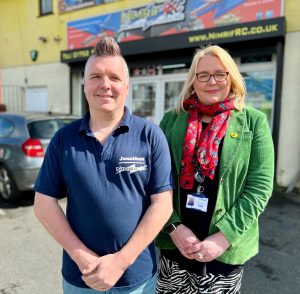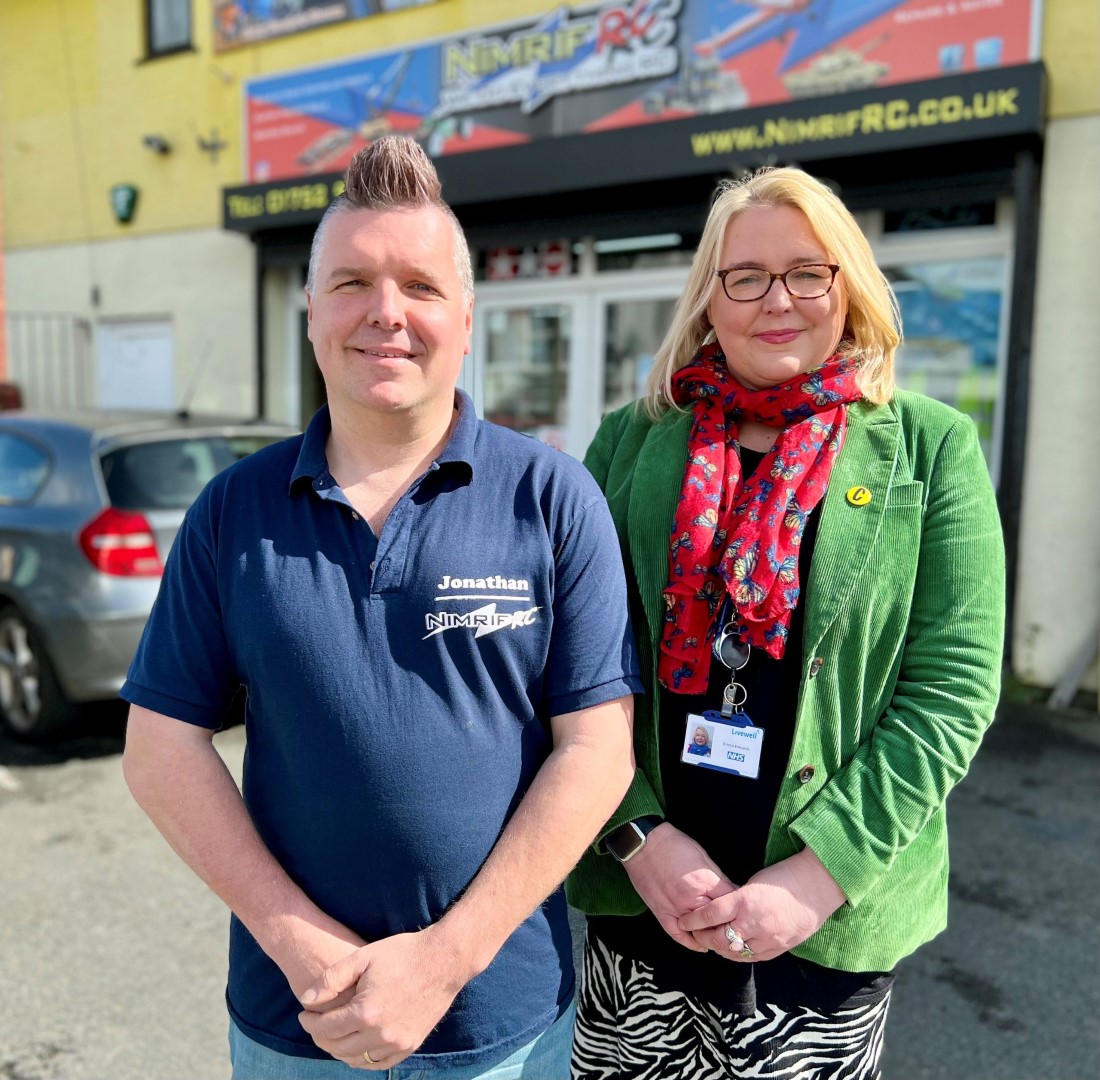When Jonathan Firmin was diagnosed with Parkinson’s, he started making t-shirts to heIp raise awareness. The slogans read “No need for electric toothbrushes” and “I make a perfect cocktail shaker.”
He hoped it would break the ice when people saw him and open up a conversation, particularly in his remote-control racing shop in Plymouth. “Most people were quite shocked to find out I had Parkinson’s – even some of my close friends. Everyone has been really supportive.”
Parkinson’s is a progressive neurological condition. It occurs when a small group of nerve cells in the brain no longer produce enough dopamine. This is a chemical that transmits messages from the brain to other parts of the body, enabling people to perform smooth, coordinated movements. Without enough dopamine, it causes problems in the brain and gets worse over time.
He was in his thirties when he realised things weren’t quite right. “I was losing motion in my right hand. After a lot of tests and scans, it was confirmed I had Parkinson’s. When the neurologist told me, I was actually relieved. It was a shock to the system but it was also good that they had found out what was causing the paralysis. I was prescribed medication and I could get on with my life.
“It has been quite challenging. If I am having a really bad morning, trying to hug my five-year-old can be difficult. The physical fatigue I suffer with is quite extreme. Most evenings when I get home from work, I need a nap. On the upside though, I have turned the physical fatigue into a bonus. When I am too tired to physically do anything, I have sat down and taught myself electronics, programming and 3D printing. It means when I have got the energy, I can get on and enjoy these new skills.”
Now 48 years old, he has recently had Deep Brain Stimulation (DBS) surgery in Bristol. The DBS system consists of a pacemaker-type device located in the upper chest or abdomen with cables that travel up the neck and pass beneath the scalp. It improves movement symptoms by delivering electrical impulses directly to targeted areas deep within the brain.
“When the implant is working well, it makes a big difference. So many people say I look better, I look happier and I feel much better in myself. At the moment I have the shakes. The implant normally stops them but because I haven’t had the operation that long ago, the swelling in the brain has gone down which makes the implant less effective. I am due to go back in a few weeks’ time to have the implant turned up. I know it is probably going to take another six months to get the implant working a hundred percent correctly, but it has made a major difference.
“I don’t believe that I’m going to let something like this beat me. I live by a slogan I use which is ‘racing to beat Parkinson’s’. It’s a race that I’m never going to beat Parkinson’s, but Parkinson’s is never going to beat me.”

Jonathan and specialist Parkinson’s nurse Emma
Livewell Southwest supports more than 700 people with Parkinson’s in Plymouth, South Hams and West Devon. Two specialist community nurses, Emma Edwards and Stacey Pearce carry out home visits, clinics and virtual appointments. They play a pivotal role in providing expert care to people with the condition.
Emma said: “Our role is to support the person with Parkinson’s and their family. We optimise their medication regime, so we prescribe medication for them and monitor it. We make sure they have got enough information about the condition and are the first point of contact if they have any questions at all. We liaise very closely with their neurologists and we meet on a weekly basis with the team at University Hospitals Plymouth NHS Trust to discuss patient treatment plans.
“People like Jonathan that are diagnosed under the age of 50, most are still working, they might have young families, the symptoms are sometimes a little bit different. We see a lot of fatigue and we see a lot of dystonia which is muscle stiffness. Even the tremor can present differently. It can be faster in its amplitude.
“In the UK, it is estimated there are 153,000 people with Parkinson’s. The majority of them are over 65 but Parkinson’s can happen to anybody, at any age. It is obviously more rare in younger people, but it is thought around ten percent of those diagnosed with the disease are under 50 years old.
“If you feel something isn’t quite right, if your muscles are always stiff, if you are demonstrating a tremor, if you are slowed up in your movement, please go and see your GP. They will examine you and decide whether they refer you to be seen by a specialist neurologist.
“There is a real array of different treatments. Getting a person on the right one means people with Parkinson’s can get their life back. They can continue in work, get back into exercise and enjoy their lives with their families.
“It is really important to raise awareness about this condition to battle the stigma that people might feel. Also, for people to know that this isn’t something that just happens to older people.”


